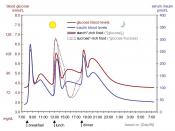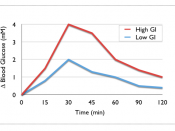Hypoglycemia is the exact opposite of diabetes. It affects the levels of glucose in the blood. While diabetes causes elevated blood glucose levels, hypoglycemia causes low blood glucose levels. In hypoglycemia, the level of blood sugar reaches low levels, which causes a variety of symptoms depending on how quickly the levels drop and how low the level gets. Mild cases can usually be regulated through diet, while more severe cases may require assistance from other people.
The pancreas regulates the levels of glucose in the body. When there is a change in blood glucose levels, the pancreas releases one of two hormones, glucagon and insulin. When levels of glucose in the blood are too low, the pancreas releases glucagon, bringing the level up. If the levels of glucose in the blood are too high, the pancreas releases insulin to help the body use the sugar for energy, bringing the levels back down.
The adrenal glands are also used when blood glucose levels drop below normal. When glucose levels drop below normal, the adrenal glands release adrenaline as an emergency action, raising glucose levels a small amount. Adrenaline can also cause unwanted side effects, such as a rapid pulse, sweating, and nervousness.
One of the main systems of the body that is affected by hypoglycemia is the central nervous system. The brain is very sensitive to low glucose levels in the blood. As glucose levels in the body fall, functions of the brain begin to fail. Reading, writing, and simple math may become affected. In result of affecting the CNS, muscles are also affected when glucose levels drop. During times of low blood glucose levels in the body, some muscles may fail to work properly, or the person may become slow and unable to walk or write steadily.


